You’ve probably walked a lot today. Maybe you’ve been on your feet all day at work, chasing kids, standing in line, or just living life. And now, your feet are screaming. But instead of reaching for painkillers or ignoring it, what if you could turn that discomfort into deep, lasting relief-just by giving your feet a little love?
Why Foot Massage Isn’t Just a Luxury
Foot massage isn’t some fancy spa trend. It’s one of the oldest forms of healing, used for thousands of years in China, India, and Egypt. Today, science backs it up. A 2021 study in the Journal of Alternative and Complementary Medicine found that people who got regular foot massages reported significantly lower stress levels and better sleep within just four weeks. Not because of magic, but because your feet are packed with nerve endings-over 7,000 of them. That’s more than your fingertips. When you massage them, you’re not just soothing tired skin. You’re sending calming signals straight to your brain.Think of your feet like a control panel. Press the right spots, and you can ease headaches, reduce bloating, even help with digestion. It’s not woo-woo. It’s anatomy.
What Exactly Is a Foot Massage?
A foot massage is exactly what it sounds like: hands (or tools) working over the soles, tops, and sides of your feet. But there’s more to it than just rubbing. Some styles focus on pressure points tied to organs-this is called reflexology. Others are more about general relaxation, using oils, warmth, and slow, rhythmic strokes. In London, you’ll find both. Reflexology clinics often treat specific issues like insomnia or anxiety. Spa-based foot massages are more about unwinding after a long day.Here’s the thing: you don’t need a professional to get results. Even five minutes a day, using your thumbs to press along the arch, can make a difference. But if you want deeper relief, a trained therapist knows where to apply pressure-and how much.
Real Benefits You Can Feel
Let’s cut through the fluff. What does foot massage actually do for you?- Reduces stress: A 15-minute session lowers cortisol (your stress hormone) by up to 25%, according to research from the University of Miami.
- Improves circulation: Your feet are farthest from your heart. Massage helps blood flow back up, reducing swelling and cold feet-especially helpful if you’re on your feet all day.
- Relieves plantar fasciitis pain: If your heel aches in the morning, regular foot massage can loosen tight tissue and reduce inflammation.
- Helps with sleep: One 2020 study showed participants fell asleep 30% faster after weekly foot massages for four weeks.
- Boosts mood: The gentle pressure triggers endorphins. That’s your body’s natural happy chemical.
One client I spoke with, Sarah, 52, works as a nurse in Camden. She started doing 10-minute foot rubs every night after her shift. Within two weeks, her chronic ankle pain faded. "I used to take ibuprofen every night," she told me. "Now I just sit down, roll a tennis ball under my foot, and breathe. It’s my quiet time."
Types of Foot Massage Available in London
London offers a wide range of options. Here’s what you’ll find:- Traditional Reflexology: Focuses on pressure points linked to organs. Often done in clinics like The Reflexology Centre in Notting Hill or The Foot Clinic in Chelsea.
- Swedish Foot Massage: Light, flowing strokes with warm oil. Great for relaxation. Found in most luxury spas like The Spa at Mandarin Oriental or The Lanesborough.
- Thai Foot Massage: Uses sticks and ropes to apply deep pressure along energy lines. Popular at Thai-inspired wellness spots like Lotus Spa in Soho.
- Self-Massage Tools: Foam rollers, spiked balls, electric massagers. Easy to use at home. Brands like Hyperice and Theragun make foot-specific models.
- Acupressure Slippers: Walk around in slippers with raised nodules. Not as deep as a hands-on massage, but great for daily maintenance.
Reflexology is best if you have a specific issue-like headaches or digestive trouble. Swedish is ideal if you just want to melt away stress. Thai offers the deepest tension release. And tools? Perfect for daily upkeep.
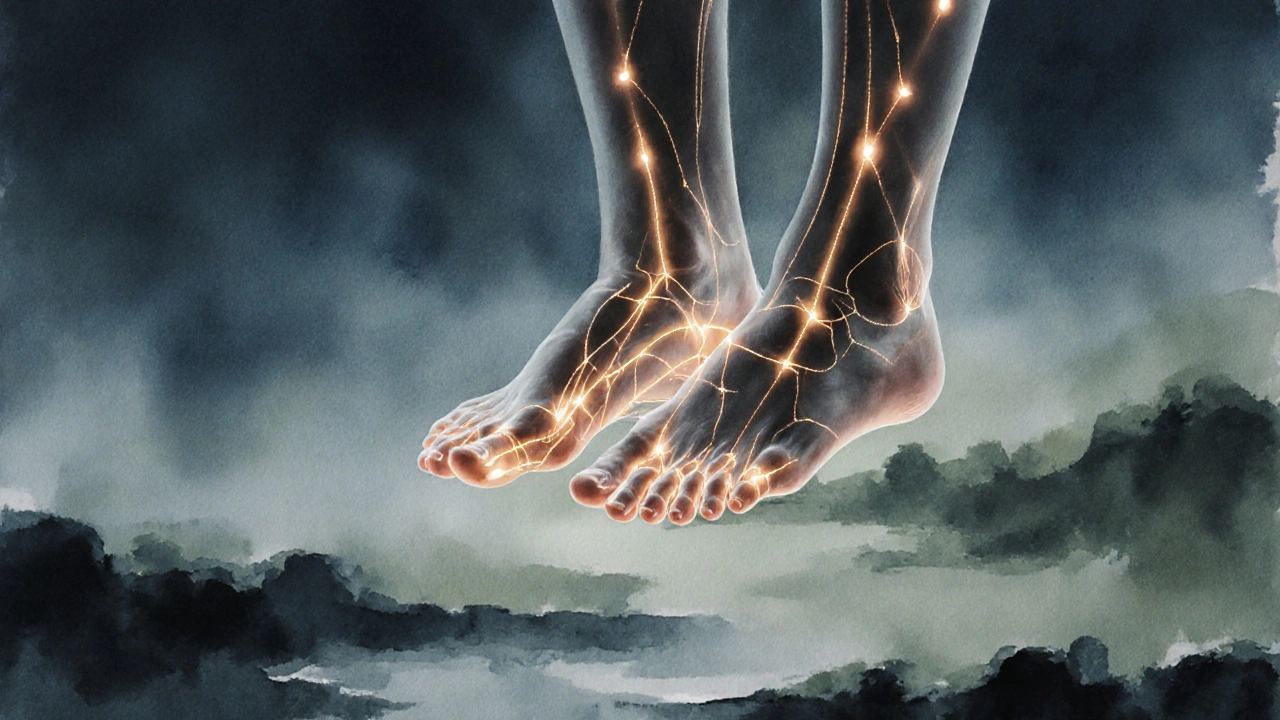
How to Find a Good Foot Massage in London
You don’t need to spend a fortune. Here’s how to find quality without the hype:- Check reviews on Google and Trustpilot. Look for mentions of "relaxed," "not rushed," or "pain relief." Avoid places with only 5-star reviews-real ones have a few 4s.
- Ask your GP or physiotherapist. Many recommend trusted reflexologists for chronic pain.
- Look for therapists with certifications: BSc in Reflexology or membership with the British Reflexology Association.
- Try a local wellness studio. Places like The Holistic Hub in Hackney or The Mindful Body in Islington offer affordable drop-in sessions (£25-£35).
- Don’t ignore mobile therapists. Apps like Handy or Bookafy let you book a therapist to come to your home in London.
Pro tip: Book your first session midweek. Weekends are busy. You’ll get more time and attention.
What to Expect During Your First Session
You walk in. The room is quiet. Soft music. A warm towel. You sit in a reclining chair, remove your shoes and socks-and that’s it. No awkward undressing.The therapist will start by warming your feet with a gentle stroke. Then, they’ll work from the heel up to the toes, using thumbs, knuckles, or even a wooden roller. You might feel some tenderness in certain spots-that’s normal. It means those areas are tense. They’ll ask you to rate the pressure: "Is this too much?" Don’t be polite. Say it. A good therapist will adjust instantly.
Most sessions last 30 to 60 minutes. You’ll leave feeling lighter. Not just in your feet. In your whole body. Some people even feel a little lightheaded-hydration helps. Drink water after.
Pricing and Booking
Here’s what you’ll pay in London as of 2025:- 30-minute session: £25-£35 (local studios, wellness centres)
- 60-minute session: £45-£70 (spas, reflexology clinics)
- Home visit: £60-£90 (includes travel)
- Package deals: Many places offer 5-session bundles for 15-20% off
Some NHS-linked clinics offer foot massage for chronic pain patients on referral. Check with your GP if you have persistent foot or leg pain.
Booking is easy. Most places let you book online. Look for options to choose your therapist’s specialty-reflexology, Swedish, or Thai. Pick the one that matches your goal.
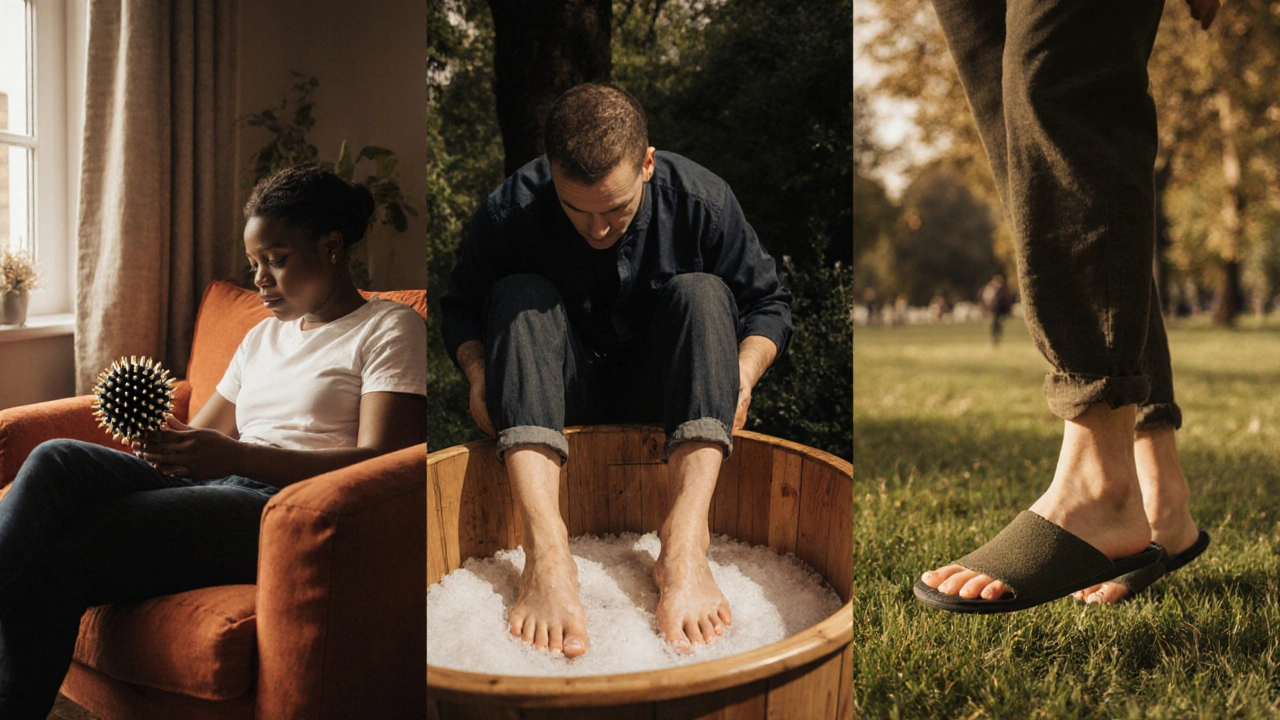
Safety Tips
Foot massage is safe for most people. But here’s what to watch for:- Avoid if you have open sores, infections, or recent foot surgery.
- Diabetics: Be cautious. Nerve damage can make you insensitive to pressure. Always tell your therapist.
- Pregnant women: Some reflexology points can trigger contractions. Stick to general relaxation massage unless cleared by your midwife.
- Don’t go too hard: Pain isn’t progress. Bruising means too much pressure.
- Hydrate: Massage releases toxins. Water helps flush them out.
Foot Massage vs. Foot Reflexology in London
| Feature | Foot Massage | Foot Reflexology |
|---|---|---|
| Primary Goal | Relaxation, circulation, muscle relief | Balance body systems, treat specific conditions |
| Pressure | Light to medium | Firm, targeted |
| Technique | Stroking, kneading, rolling | Thumb pressure on specific points |
| Best For | Stress, tired feet, general wellness | Headaches, insomnia, digestion, anxiety |
| Typical Duration | 30-60 minutes | 45-75 minutes |
| Where to Find | Spas, hotels, wellness centres | Clinics, reflexology specialists |
If you’re unsure, start with a foot massage. If you notice a pattern-like you always get headaches after long days-you might benefit from trying reflexology next.
Frequently Asked Questions
Can foot massage help with back pain?
Yes. The feet connect to the spine through reflexology points. Many people with lower back pain report relief after regular foot sessions. It’s not a cure, but it reduces muscle tension and improves posture awareness. One 2022 trial showed 68% of participants with chronic back pain had reduced discomfort after 8 weeks of twice-weekly reflexology.
How often should I get a foot massage?
For general wellness, once a week is ideal. If you’re on your feet all day or dealing with stress, twice a week helps. If you’re using it for pain relief, aim for 3-4 times a week for the first month, then taper off. Even 10 minutes a day at home counts.
Can I do foot massage myself?
Absolutely. Roll a frozen water bottle under your arch for 5 minutes. Use your thumbs to press along the ball of your foot. Try the "thumb walk"-press and slide from heel to toe. Do this while watching TV. It’s free, effective, and builds a daily habit.
Do I need special oil or lotion?
Not for self-massage. Coconut oil, almond oil, or even just water works. Professionals use massage oils for glide and skin health. Avoid anything with strong fragrances if you have sensitive skin. Unscented is safest.
Is foot massage safe during pregnancy?
Yes, but avoid certain reflexology points linked to the uterus and ovaries. Stick to gentle, general foot massage. Always tell your therapist you’re pregnant. Many London clinics have specialists trained in prenatal care.
Why do my feet hurt more after a massage?
It’s usually temporary. Deep pressure releases toxins and tight muscle knots. You might feel sore for 24-48 hours-like after a workout. Drink water, rest, and try a warm foot soak. If pain lasts longer or gets worse, stop and consult a physiotherapist.
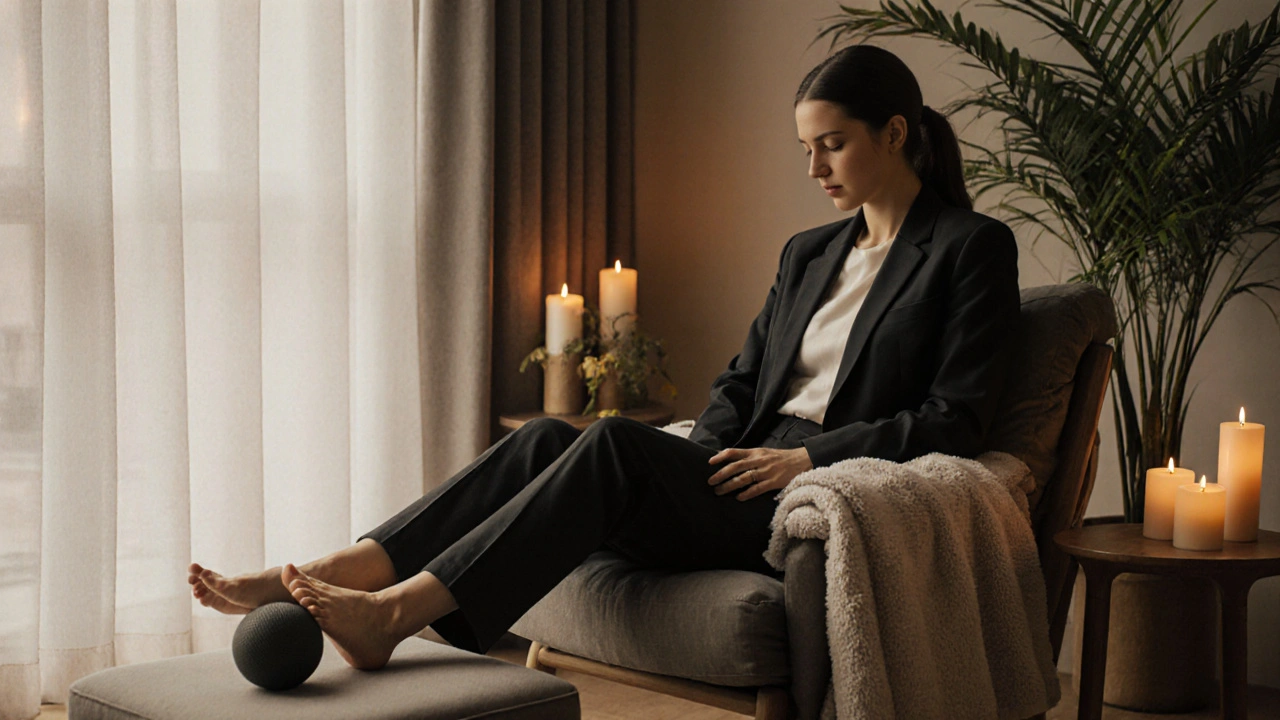

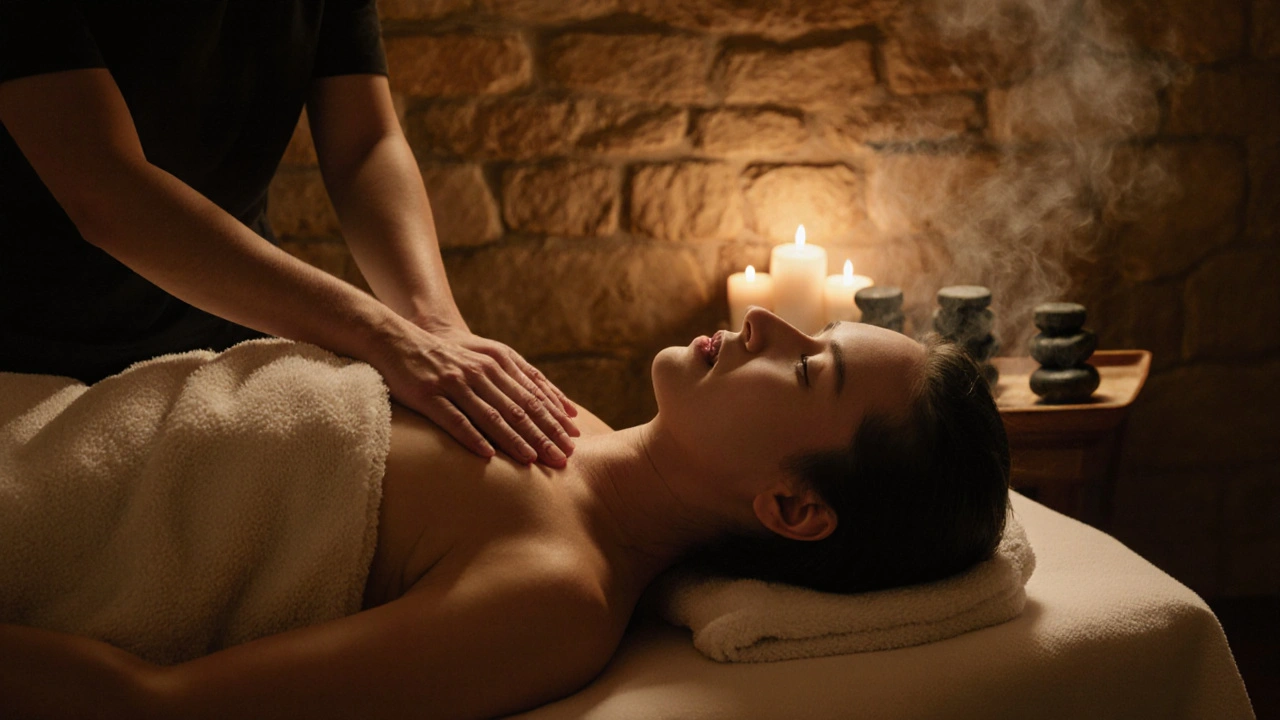

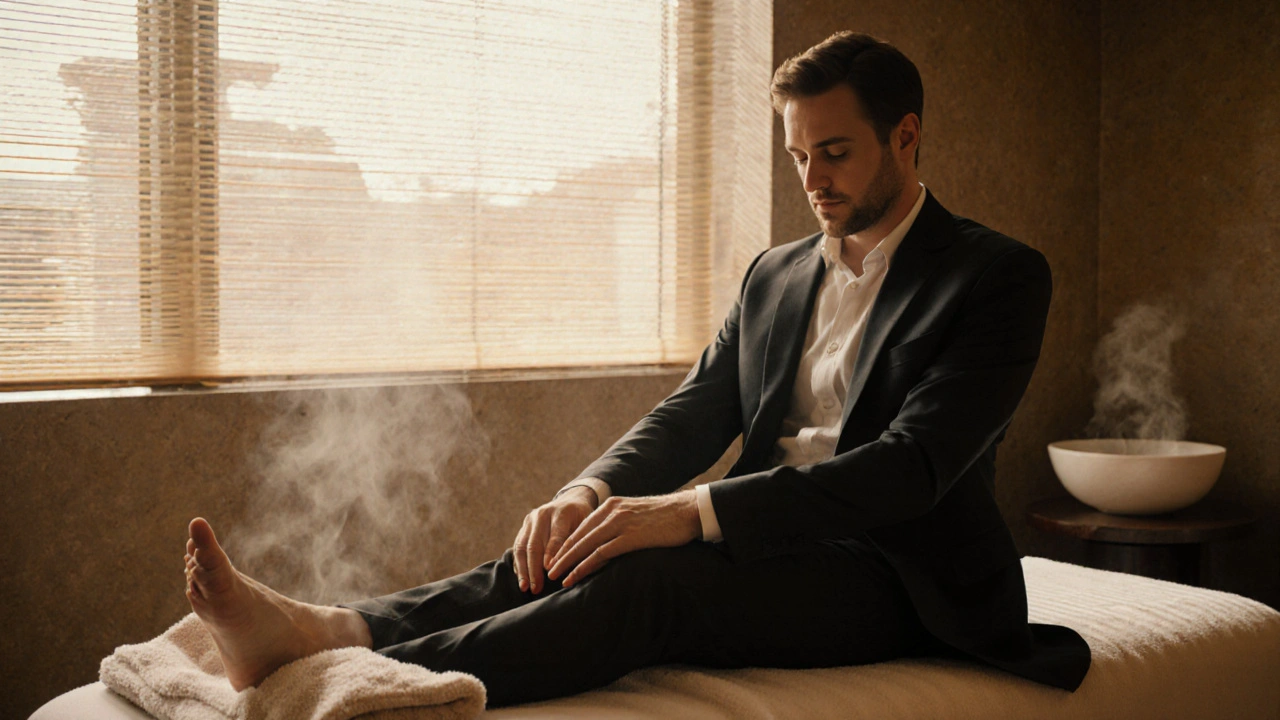
Anil Sharma
November 20, 2025 AT 05:16I never thought foot massage was more than a luxury until I started doing it after my 12-hour shifts as a delivery driver. My arches used to feel like they were cracked in half. Now I roll a golf ball under them while watching Netflix. No more ibuprofen. Just quiet and relief. It’s weird how something so simple fixes so much.
Sandie Corr
November 21, 2025 AT 21:12OMG YES 🙌 I started doing reflexology with those acupressure slippers and now I sleep like a baby. Also my headaches disappeared. Like… poof. Gone. I tell all my coworkers. They think I’m weird but I don’t care. My feet are my new zen zone. 🌿👣
Stephen Bodio
November 23, 2025 AT 15:01This is so spot on. I used to think foot massages were just for spa days, but after my physio told me to try it for my plantar fasciitis, I was sold. Just 10 minutes a night with a tennis ball changed everything. No more morning heel pain. I even got my dad into it-he’s 72 and says it’s the best thing he’s done for his feet since retiring.
Natasha Ray
November 25, 2025 AT 10:29They say foot massage helps with digestion but have you ever wondered why they never mention the government is using pressure points to track your stress levels through your soles? I mean think about it-7000 nerve endings, all mapped, all monitored. And now they want you to pay for it? That’s not healing, that’s data harvesting. I stopped going to spas after I read about the NHS pilot in 2023. They were collecting biometrics under the guise of wellness. I just rub my feet with coconut oil now. Free. Private. Untracked.
Jack Gaines
November 27, 2025 AT 07:57Been doing this for years. Thai massage in Soho is wild. Feels like someone’s cracking your bones but in a good way. Worth every penny.
Megan Garfio
November 28, 2025 AT 07:47You’re not alone. I used to think I was lazy for not moving more but now I know my feet just needed love. I do 5 minutes every night before bed. No fancy tools. Just my thumbs. I feel calmer. Happier. Like I’m finally taking care of the part of me that carries me through everything. You deserve this. 💪❤️
Christopher McDonnell
November 30, 2025 AT 06:48My mate had chronic heel pain for years. Tried everything. Then he started rolling a bottle under his foot every evening. Within a month, he was running again. No meds. No surgery. Just consistency. It’s not magic, it’s just good old-fashioned attention to the parts we forget about. Your feet work hard. Give them a break.
Margaret Berlin
November 30, 2025 AT 13:20Reading this made me want to book a session right now. I’ve been ignoring my feet for years. I’m 34, on my feet all day, and I thought soreness was just part of life. But this? This is a wake-up call. I’m trying the tennis ball trick tonight. And if it works, I’m going all in. Thank you for writing this. I needed it.